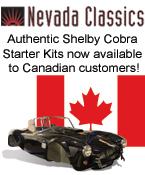Quote:
Originally Posted by xb-60

....you guys making fun of me? 
Cheers!
Glen |
I don't think so, Glen. We've all been where you are, hoping to have our cake and eat it, too. We've all had to go down that road, making concessions when it was obvious that there was no way to make good power from 1,500 RPM through 7,000 RPM. Perhaps we are making fun of ourselves for having ever believed it could be possible.
One thing I'm surprised I haven't heard in this epic discussion, though. Well, I've heard it alluded to....variable valve timing. The Honda VTEC engine is a good example....put your foot into it and when it hits 3K, hold on as the VTEK function starts to become active. Is there any way to do this with a SBF?
Well, not the way Honda did it, but in a sense, yes. I once built a 351C to stuff into a 1971 Mercury Comet (the one that looked like a Ford Maverick). I wanted a smooth idle and good top end power, so I installed a set of Rhoads lifters (could have been spelled Rhodes, I can't recall).
In essence, the hydraulic Rhoads lifters were of a "bleed-down" design. At low RPM, where the
oil pressure is not high, the plunger on the lifter (which IIRC had a small machined slot in the perimeter) would loose some of it's "height" as the
oil bled out of the body of the lifter. At low RPM this had the effect of lessening both duration and lift, which smoothed out the idle and had a positive effect on drivability. As RPM's and
oil pressure increased, the lifter "pumped back up" and the engine enjoyed greater lift and duration at exactly the RPM range where it would benefit upper RPM power.
Now, don't think this was an extreme difference....but it did make some difference. The engine wasn't capable of reaching 7K (I'm not sure any hydraulic lifter can), but there was a sort of a rush between 3,500 and 4,500 RPM's as the lifters became fully pumped up, and at idle it had that cool sound we all associate with solid lifters.
If you take all the tricks others have suggested, and this one, you might get close, but at what $$ cost, not to mention the cost to reliability and longevity.
Onward through the fog, as we say

Cheers!
Dugly



